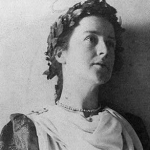Over the honored bones of Boston (resting,
as we say) old leaves’ bones
underfoot are restless; and boys and schoolgirls
going home splash through them,
reciting alphabet lately received.
They run the known, intone
the unsure patterns, repeat the magic,
nearly Grecian syllables;
and little winds are winding up their strident
lmno, R, S, T.
She was no snowy witch, but young and turning,
a mother-dear more dear now
incipiently frosty; witches most live
when she died, October;
primly colonial, mother Goose’s grave;
who did not rhyme or gather
the pages vainly: what mantic abc’s
she told she dared make charming
only to spell her children’s moral lives.
The children passing sing
the future, certainly, but knowing nothing
(as the lore requires)
and recommending nothing as they are
merely oracles
spelling their letters’ lives, not telling theirs.
They have their own games
not of the elder nation; certain cobwebs
accommodate the young,
and special weeds; and these who chant now know
no gentle Sibylla
but many seemingly answering leaves.
What there will be of signs,
of sounds so flighty and so friable,
the letters as the leaves,
boys and girls as letters, and of late
Boston’s honorable
cinders, laid quietly and always restless:
maybe a daisy, my dears,
or a white carnation, or only an
unanswerable tenderness.




Comment form: